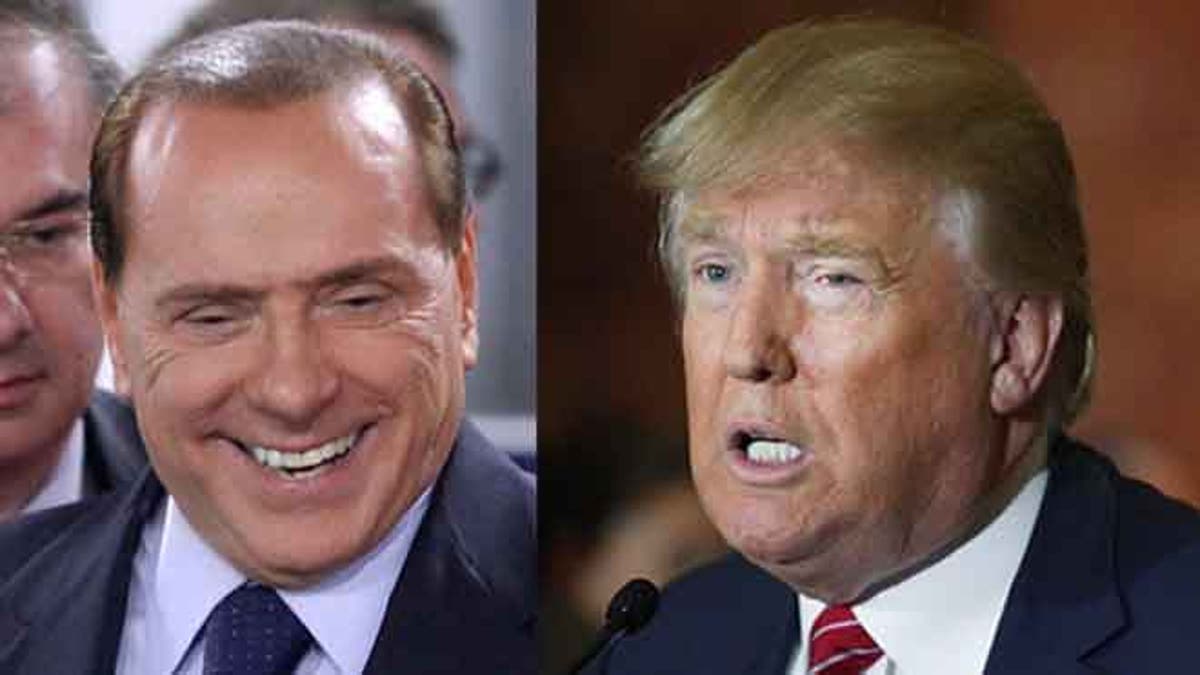
At first glance, there are undeniable similarities between Donald Trump, front-runner to become the Republican presidential candidate, and Silvio Berlusconi, three-time Prime Minister of Italy.
One, Silvio Berlusconi, the Italian Donald Trump, as it were, is a real estate tycoon who built a media empire which, in turn, served to propel him up the political ladder. The other, Trump, the American Berlusconi, is a real estate tycoon who adroitly used the media to become world-famous (for being rich and successful) and launch himself into politics.
Both are bad boys with perma-tans, aging men in expensive suits and fancy cars and beautiful young women on their arm. Trump’s wife is half his age; Berlusconi’s fiancee is a third of his.
Wealth is at the core of the public perceptions of both, but it goes beyond simply being rich. Trump and Berlusconi are business rebels, flamboyant rule-breakers, with a proud touch of bare-knuckled street-style. Berlusconi is a self-made billionaire in a country where there is little-to-no upward mobility. Trump was born into a well-to-do family in Queens, up against the windowpane of Manhattan high society — on the outside looking in.
Both are bad boys with perma-tans, aging men in expensive suits and fancy cars and beautiful young women on their arm. Trump’s wife is half his age; Berlusconi’s fiancee is a third of his. Both have a history of multiple divorces and staggering alimony payments. Both are ribald and inappropriate, the opposite of politically correct, and proud of it. For some, this is very much part of the attraction.
With his big eyes and his mouthful of white teeth, Berlusconi resembles a charming crocodile, smiley but dangerous. One might hesitate to leave one's daughter, or business, alone with him. Yet Italians have voted him into the country's highest office, over more safer and more qualified men, three times. Trump is decidedly more wooly and angry than Berlusconi, like a badger with a stomach ache, or a scary boss who loves to fire people. Yet prospective GOP voters, so far, choose him over nicer, more experienced candidates.
- Donald Trump, Jeb Bush trade barbs in new campaign videos
- At rally, Trump calls Rubio a traitor for running against his mentor Bush
- Two new video games let users toss tacos and soccer balls at Donald Trump
- Donald Trump spars with Jorge Ramos during press conference: ‘Go back to Univision!’
- Presidential candidates’ net worths range from $57,000 to more than $9 billion
- Donald Trump on confrontation with reporter Jorge Ramos: ‘I handled that well’
- Geraldo to Trump: You’re wrong, boss, immigrant murder wave is factually false
- Opinion: Xenophobia is a dangerous political weapon
- Latinos unite against Trump’s controversial comments
As politicians, the Italian Trump and the American Berlusconi are men with outsized confidence in their abilities to think on their feet, close the deal, get what they want. Knowledge is not a prerequisite. They trust instincts over facts. This is partly why they can get away with vague or inexistent stands on issues. Both ask the voters to trust their judgement rather than their program, the man rather than the plan.
As politicians, both are also dismissed as lightweights, or crazies, by the cultural and political elite -the same elite that Berlusconi has defeated in election after election. With Trump too, the media, and the GOP political establishment, greeted his candidacy with bemusement, which turned into stupefied incredulity as he shot up the polls.
There are, of course, many profound differences between Trump and Berlusconi, both in personal biography and political views, and it is still early in Trump’s political venture, but Trump’s opponents might profit from pondering the following lessons from Berlusconi’s success in Italy:
1. Ignoring him won’t work. Condescending or belittling his positions won’t either. Refusal to take Berlusconi seriously as a candidate just reinforced his rebel image. For Trump too, you have to take him on and show how he is wrong, point by point. If you stay quiet and hope voters sort out the crazy from the serious, you will lose.
2. Berlusconi is famous for springing completely crazy and unrealistic, but popular, surprise policy proposals in the middle of an electoral campaign. This forces his opponents to talk about his issue – and cluck their teeth and shake their heads and sound like grinches – while Berlusconi smiles confidently and rises in the polls. Trump has already dominated the early GOP discussion with his totally unrealistic and damaging immigration proposal. The only way to respond to political craziness is also the most natural one: laugh and change the subject.
3. Finally, the more political candidates denigrate governance and politics, the more they make the case for candidates posing as political outsiders like Berlusconi and Trump. The more one thinks that all politicians are corrupt, the more one is tempted to vote for someone who specializes in saying “you’re fired.”
Ironically, a divisive, larger-than-life personality like Donald Trump may pose more of a mortal danger to other candidates on his side of the political spectrum than to potential general election opponents. Silvio Berlusconi, for example, sucked all of the air out of the right, but was polarizing enough as a figure to allow opponents to routinely rouse their base against him.
That base was never enough because, as Italian politicians found out to their dismay, and American politicians are seeing right now, if you give a deal-maker enough time and space, they find a way to close the deal with voters.
